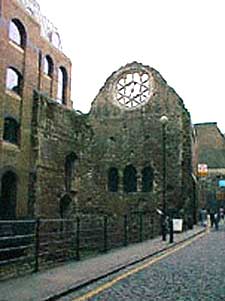|
|
 The American Connection
The Liberty of the Clink
Clink Street, Southwark, SE1
 The Clink, a gaol so notorious that its name became slang for imprisonment, stood on the London estate of the Bishops of Winchester which was known as the Liberty of the Clink. The Clink, a gaol so notorious that its name became slang for imprisonment, stood on the London estate of the Bishops of Winchester which was known as the Liberty of the Clink.
A place of terror for five centuries, the Clink was adjacent to the Bishop's palace, Winchester House, a fragment of which (pictured right) remains on the South bank at Pickford's Wharf.
The Clink was first used to detain anyone breaking the peace within the boundaries of the Liberty. These included prostitutes from the Bishop's own licenced Bankside brothels and their customers. By the 16th century, though, the prison was being used to incarcerate anyone whose religious views countered those of the state. Protestants began to fall into this category as much as Catholics as many started to question and break away from the Anglican tradition.
|
Brownists were followers of Robert Browne (1550-1633) a separatist clergyman who was one of the earliest advocates of the Congregational principles which were later taken to America by the Pilgrim Fathers. During the 16th century Brownists were in direct conflict with the Church of England on a number of issues, particularly in the belief that church members should have a voice in choosing who should interpret the Scriptures for them.
| Among the Protestant separatists who were imprisoned as heretics were a group who founded an independent church in Southwark. Henry Barrowe, John Greenwood and John Penry were Brownists - forerunners of the Puritan movement which led to the emigration of the Pilgrim Fathers. All three were put to death for their beliefs in 1593.
Almost fifty years later, dissenters to a very different regime were confined in the Clink. As bitter disagreements between King Charles I and his Parliament turned to civil war, it became a prison for Royalists. After the war was over, the vast estate of the Bishop of Winchester was sold off and the Clink gaol fell into disuse. Finally, the place housed only debtors.
No more than a dismal hovel, the Clink was burned down in the *Gordon Riots of 1780. It was not rebuilt.
*The Gordon Riots started when activists opposed to the Catholic Relief Act of 1778 began a protest march from St. George's Fields, Southwark to the Houses of Parliament. Led by Lord George Gordon, an MP and Protestant agitator, the marchers aimed to submit a petition objecting to the end of religious discrimination against Catholics. But the 50,000-strong mob soon got out of hand. Violence and looting broke out and several prisons were burned down including Newgate, Clerkenwell, the Fleet and the Clink. The uproar continued for four days and an estimated 850 people were killed. George Gordon was arrested on a charge of high treason but was acquitted thanks to the brilliant defence of his lawyer. A group of 21 ringleaders were found guilty and hanged.
* Dickens' Barnaby Rudge - A tale of the Riots Of 'Eighty tells the story of the Gordon Riots. In the preface of the book, the author writes:
'No account of the Gordon Riots having been to my knowledge introduced into any Work of Fiction, and the subject presenting very extraordinary and remarkable features, I was led to project this Tale.
It is unnecessary to say, that those shameful tumults, while they reflect indelible disgrace upon the time in which they occurred, and all who had act or part in them, teach a good lesson. That what we falsely call a religious cry is easily raised by men who have no religion, and who in their daily practice set at nought the commonest principles of right and wrong; that it is begotten of intolerance and persecution; that it is senseless, besotted, inveterate and unmerciful; all History teaches us. But perhaps we do not know it in our hearts too well, to profit by even so humble an example as the `No Popery' riots of Seventeen Hundred and Eighty.'

Winchester House can be seen from street level
 London Bridge. London Bridge.
Copyright © Jan Collie 2002
Published by permission of the author.
All rights reserved. No reproduction, copy or transmission of this publication may be made without written permission.
| |
|